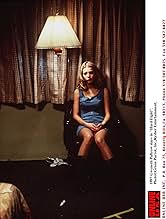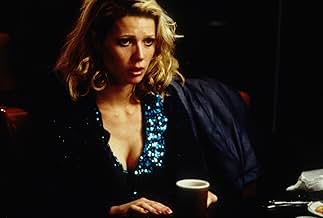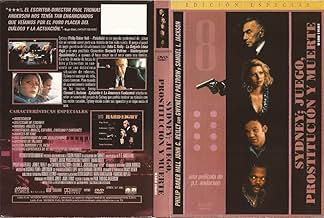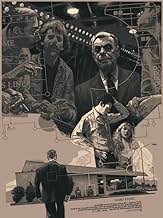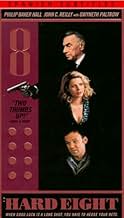El jugador profesional Sydney le enseña a John los trucos del oficio. Las cosas van muy bien hasta que John se enamora de Clementine.El jugador profesional Sydney le enseña a John los trucos del oficio. Las cosas van muy bien hasta que John se enamora de Clementine.El jugador profesional Sydney le enseña a John los trucos del oficio. Las cosas van muy bien hasta que John se enamora de Clementine.
- Dirección
- Guionista
- Elenco
- Premios
- 2 premios ganados y 8 nominaciones en total
Philip Seymour Hoffman
- Young Craps Player
- (as Phillip Seymour Hoffman)
- Dirección
- Guionista
- Todo el elenco y el equipo
- Producción, taquilla y más en IMDbPro
Opiniones destacadas
This first film from Paul Thomas Anderson shows the promise he would later fulfill with BOOGIE NIGHTS. The writing here is as sharp as it was in the later film, but it must be said as a director, he sometimes lets scenes go on too long (ironic that BOOGIE NIGHTS, which is a longer film, is also a tighter one). The main connection between both films is Anderson's obvious affection for his characters. Also the relationship between Sydney and John doesn't turn out the way you'd expect. And Anderson is to be commended for avoiding melodrama.
Philip Baker Hall is one of those actors who you may not know by name, but when you see him you instinctively feel he's right for the part, no matter how small. This is one of his rare leading roles, and he's perfect, showing the character's success and also his loneliness, without sentimentalizing it. John C. Reilly is properly eager and naive as John. Samuel L. Jackson is dependable here, and Gwyneth Paltrow proves she doesn't need a British accent to give a good performance. She and Jackson should also be commended for backing Anderson when he had problems with the studio.
Philip Baker Hall is one of those actors who you may not know by name, but when you see him you instinctively feel he's right for the part, no matter how small. This is one of his rare leading roles, and he's perfect, showing the character's success and also his loneliness, without sentimentalizing it. John C. Reilly is properly eager and naive as John. Samuel L. Jackson is dependable here, and Gwyneth Paltrow proves she doesn't need a British accent to give a good performance. She and Jackson should also be commended for backing Anderson when he had problems with the studio.
'Hard Eight' may not be one of Paul Thomas Anderson's best, his later films being more complex and more refined, but even when Anderson was not at his best he was much better than most directors in that position.
For a feature film debut, 'Hard Eight' is still very promising. It does have moments of lethargic moments, the odd clunkiness and the ending is somewhat anti-climactic, but the potential seen throughout the film is enormous and from the start it is obvious that 'Hard Eight' knows its own strengths and makes the most out of them.
It looks impeccable, even when not very experienced in directing at this particular point Anderson's distinctive style is evident here with the long takes and tracking shots that suggest a Martin Scorsese influence. It's a beautifully shot film, and even if not as refined as his later films Anderson shows great promise as a director, showing a knack for visual style and excellent direction of actors. The music is suitably atmospheric, sometimes quirky, sometimes ominous and sometimes elegant.
Much of the script is very naturalistic and remarkably feels like the characters are talking like real people. It's tautly structured and thought-provoking too. 'Hard Eight' is a film quite light on plot, but rich in characterisation, not a bad thing considering that it is essentially a character study. The storytelling is still quite nicely done though, and while the characters are not the easiest to like there is a compelling realism about them and they're interesting.
Phillip Baker-Hall is magnetic in the lead role, in a performance of towering sincerity, while John C. Reilly matches him very well with an appealing gawky charm, Gwyneth Paltrow is charming and moving and Samuel L. Jackson brings plenty of flesh and succeeds in making the character too much of a retread of previous characters. Philip Seymour Hoffmann makes a very entertaining if somewhat too brief appearance.
Overall, very promising debut from Anderson though he went on to even better things with meatier material and an even more refined style. As is evident from the superb 'Boogie Nights'. 8/10 Bethany Cox
For a feature film debut, 'Hard Eight' is still very promising. It does have moments of lethargic moments, the odd clunkiness and the ending is somewhat anti-climactic, but the potential seen throughout the film is enormous and from the start it is obvious that 'Hard Eight' knows its own strengths and makes the most out of them.
It looks impeccable, even when not very experienced in directing at this particular point Anderson's distinctive style is evident here with the long takes and tracking shots that suggest a Martin Scorsese influence. It's a beautifully shot film, and even if not as refined as his later films Anderson shows great promise as a director, showing a knack for visual style and excellent direction of actors. The music is suitably atmospheric, sometimes quirky, sometimes ominous and sometimes elegant.
Much of the script is very naturalistic and remarkably feels like the characters are talking like real people. It's tautly structured and thought-provoking too. 'Hard Eight' is a film quite light on plot, but rich in characterisation, not a bad thing considering that it is essentially a character study. The storytelling is still quite nicely done though, and while the characters are not the easiest to like there is a compelling realism about them and they're interesting.
Phillip Baker-Hall is magnetic in the lead role, in a performance of towering sincerity, while John C. Reilly matches him very well with an appealing gawky charm, Gwyneth Paltrow is charming and moving and Samuel L. Jackson brings plenty of flesh and succeeds in making the character too much of a retread of previous characters. Philip Seymour Hoffmann makes a very entertaining if somewhat too brief appearance.
Overall, very promising debut from Anderson though he went on to even better things with meatier material and an even more refined style. As is evident from the superb 'Boogie Nights'. 8/10 Bethany Cox
"Sydney" is the first film from director Paul Thomas Anderson better known as the director of "Boogie Nights", this years loathed and loved "Magnolia" and several Fiona Apple videos. This film is essentially about a man who seems to pick up kids off the street (John C. Reilly, Gwyneth Paltrow) and teach them the ways of the casino and gambling and helps them out. Sydney knows everything about everything, the man is flawless, or is he? Paltrow is good as a waitress who just can't stop prostituing herself. Reilly is funny and sweet as John the serrogant son of Sydney. Jackson is slimey, sleazy and somehow likeable as only Jackson can be. And of course Philip Baker Hall as Sydney is amazing. "Sydney" is merely a taste of what was to come from this young director. There are some long steadicam shots and there is the funny, Tarantinoish (minus much of the swearing and less pop culture references) dialogue. Anderson knows how to use a camera and editing to their full effect and make a scene that could be boring if directed by anyone else, exciting. Look for cameos from many future Andersonites (Philip Seymour Hoffman, Robert Ridgely) The film is a cut above most crime thrillers, this one is more light hearted (for a crime movie, it's not light hearted for say a romantic comedy, no no :), funny and even touching in some parts. If you are a fan of Anderson rent this, see how he has increased his creativity and grown on his talents since this film. If you are not a fan of Anderson rent this, cause if the things you didn't like about Magnolia were the long running time and some pointless steadicam shots, you'll be happy to see this one is little over 1 hour 40 min and only has several long steadicam shots that are used for a reason. Listen for the great score by "Boogie Nights" composer Michael Penn and "Magnolia" composer Jon Brion and a Christmas song at the end credits by Penn and his wife, "Magnolia" soundtrack star Aimee Mann.
Though he is best known for two ambitious ensemble pieces such as Boogie Nights and Magnolia, writer/director Paul Thomas Anderson was first noticed thanks to a low-key, unpretentious character study, a gem called Sydney.
The film takes its title from the main character, a lonely elder man played by Philip Baker Hall. At a diner he runs into John (John C. Reilly), a poor fella who has just lost all his money. Sydney buys him coffee, and after a little chat he persuades him to come to Reno. Once there, they manage to get a free room and under Sydney's tutelage John quickly becomes a successful gambler. All's well until he falls in love with Clementine (Gwyneth Paltrow), a waitress and part-time prostitute, and trouble ensues with a gangster named Jimmy, meaning Sydney will have to come up with something extreme to save his protégé.
For a first-time director Anderson shows great skills and confidence: even though he doesn't do much but follow four characters, he frames each shot to perfection and proves he is every bit as good as Scorsese at staging tracking shots (a thing he perfected on his next two features). But style doesn't really matter here: the important thing is that the audience cares for the story, and this essentially happens courtesy of sublime dialogue and great acting.
Anderson fought really hard to keep the movie's original title (and partially failed, which is why the film is known as Hard Eight in some countries), and the reason is clear from the beginning: the picture rests entirely on Hall's shoulders, and he carries it admirably. His performance is nuanced and genuine, and he manages to ensnare the viewer even when we are not sure what his motives are (and once they are revealed, it is not that important). Reilly is equally good, in a turn that opened his way to becoming one of the most reliable character actors in Hollywood, and the same intensity emerges from Paltrow and Jackson, the latter in particular adding extra dramatic flesh to what could have been a rehash of his more famous roles (Pulp Fiction etc.). Even Philip Seymour Hoffman, who has a brief but memorable role as a cocky gambler, gets his opportunity to shine, showing beyond any doubt that Anderson has a great eye for casting. He also knows how to write: the dialogue flows freely and seamlessly between the players, spawning some of the most affecting, realistic conversations ever heard in a movie, although the director can't resist the temptation to insert a couple of in-jokes as well (in one scene, Hall mentions two characters he wound up playing in Boogie Nights and Magnolia).
Overall, a very good film, and a must-see for PT Anderson fans: like many other directors who rose to fame in the '90s (Tarantino, Rodriguez, Bryan Singer) he proved right from the start what he was capable of, and has never disappointed the audience since that.
The film takes its title from the main character, a lonely elder man played by Philip Baker Hall. At a diner he runs into John (John C. Reilly), a poor fella who has just lost all his money. Sydney buys him coffee, and after a little chat he persuades him to come to Reno. Once there, they manage to get a free room and under Sydney's tutelage John quickly becomes a successful gambler. All's well until he falls in love with Clementine (Gwyneth Paltrow), a waitress and part-time prostitute, and trouble ensues with a gangster named Jimmy, meaning Sydney will have to come up with something extreme to save his protégé.
For a first-time director Anderson shows great skills and confidence: even though he doesn't do much but follow four characters, he frames each shot to perfection and proves he is every bit as good as Scorsese at staging tracking shots (a thing he perfected on his next two features). But style doesn't really matter here: the important thing is that the audience cares for the story, and this essentially happens courtesy of sublime dialogue and great acting.
Anderson fought really hard to keep the movie's original title (and partially failed, which is why the film is known as Hard Eight in some countries), and the reason is clear from the beginning: the picture rests entirely on Hall's shoulders, and he carries it admirably. His performance is nuanced and genuine, and he manages to ensnare the viewer even when we are not sure what his motives are (and once they are revealed, it is not that important). Reilly is equally good, in a turn that opened his way to becoming one of the most reliable character actors in Hollywood, and the same intensity emerges from Paltrow and Jackson, the latter in particular adding extra dramatic flesh to what could have been a rehash of his more famous roles (Pulp Fiction etc.). Even Philip Seymour Hoffman, who has a brief but memorable role as a cocky gambler, gets his opportunity to shine, showing beyond any doubt that Anderson has a great eye for casting. He also knows how to write: the dialogue flows freely and seamlessly between the players, spawning some of the most affecting, realistic conversations ever heard in a movie, although the director can't resist the temptation to insert a couple of in-jokes as well (in one scene, Hall mentions two characters he wound up playing in Boogie Nights and Magnolia).
Overall, a very good film, and a must-see for PT Anderson fans: like many other directors who rose to fame in the '90s (Tarantino, Rodriguez, Bryan Singer) he proved right from the start what he was capable of, and has never disappointed the audience since that.
Paul Thomas Anderson's first film, Sydney (titled 'Hard Eight' by the distributors), has a story, but its more concerned about the characters, and how these actors play them. Like its inspiration, Jean-Pierre Melville's Bob le Flambeur, understanding who these people are in this seedy, desperate environment, is the key. The script is intelligent, and contains a truth that isn't found in most "off-beat" crime films. In fact, the crimes in the film, while not without the importance to the story, is secondary to how these people are around one another, the courtesy, the un-said things, the mishaps, and the truths. In tune with Melville, the film is decidedly European- the story is quite leisurely, almost too much so, but in the characters Anderson has created and fleshed out he has people we can care about.
Philip Baker Hall, in a towering performance of professionalism (he's one of those great character actors who practically wears the years of his life on his face, not to sound pretentious about it), is the title character of Sydney. He offers Jimmy (John C. Reilly, believable in a role seemingly more like himself than his Reed Rothchild in Anderson's Boogie Nights) a cigarette and a cup of coffee, and then finds out through the conversation his mother's passed on. He offers up an intricate, but rewarding, way of making money in a casino without laying down a card (the slots, and a different scheme). Flash ahead two years later (awesome transition, by the way) where Jimmy is with Clementine (Gwyneth Paltrow, a good performance). Things seem to be going alright all around, except that Jimmy has a violent (shown off-screen, of course) run-in, and needs Sydney's help. But there's another secret that has yet to be told.
All the little details of the story are accentuated by a directorial style that is usually peerless, and the tracking shots that have become paramount in Anderson's films (i.e. opening of Boogie Nights, walking through TV studio in Magnolia) are as smooth and interesting as anything from Scorsese. The Vegas Muzak is a touch that adds, like with Melville, a cool kind of touch not at all un-like film-noir. It's actually a thin line that Anderson is walking; how to make the Melville story's elements (an aging gambler past his prime, watching over the young people in their own messes, seeing the old turn to new) as one's own. I think he's achieved that in the film with a sense of sincerity with the characters dialog with each other. Perhaps Sydney has a different agenda than just being friendly. But Anderson wisely allows Hall to make the right choices with just certain facial expressions, what isn't said that counts. And the scenes with Samuel L. Jackson bring out the kind of intensity, sometimes quiet sometimes not, that hallmark his best performances. Maybe not a masterpiece, but it certainly isn't the work of an amateur, assured in his own script as a director, and in the strengths of his four key players.
Philip Baker Hall, in a towering performance of professionalism (he's one of those great character actors who practically wears the years of his life on his face, not to sound pretentious about it), is the title character of Sydney. He offers Jimmy (John C. Reilly, believable in a role seemingly more like himself than his Reed Rothchild in Anderson's Boogie Nights) a cigarette and a cup of coffee, and then finds out through the conversation his mother's passed on. He offers up an intricate, but rewarding, way of making money in a casino without laying down a card (the slots, and a different scheme). Flash ahead two years later (awesome transition, by the way) where Jimmy is with Clementine (Gwyneth Paltrow, a good performance). Things seem to be going alright all around, except that Jimmy has a violent (shown off-screen, of course) run-in, and needs Sydney's help. But there's another secret that has yet to be told.
All the little details of the story are accentuated by a directorial style that is usually peerless, and the tracking shots that have become paramount in Anderson's films (i.e. opening of Boogie Nights, walking through TV studio in Magnolia) are as smooth and interesting as anything from Scorsese. The Vegas Muzak is a touch that adds, like with Melville, a cool kind of touch not at all un-like film-noir. It's actually a thin line that Anderson is walking; how to make the Melville story's elements (an aging gambler past his prime, watching over the young people in their own messes, seeing the old turn to new) as one's own. I think he's achieved that in the film with a sense of sincerity with the characters dialog with each other. Perhaps Sydney has a different agenda than just being friendly. But Anderson wisely allows Hall to make the right choices with just certain facial expressions, what isn't said that counts. And the scenes with Samuel L. Jackson bring out the kind of intensity, sometimes quiet sometimes not, that hallmark his best performances. Maybe not a masterpiece, but it certainly isn't the work of an amateur, assured in his own script as a director, and in the strengths of his four key players.
¿Sabías que…?
- TriviaAccording to Philip Baker Hall, Philip Seymour Hoffman improvised his scenes, including most of the craps scene.
- ErroresAt 30: The craps table that Sydney walks by shows players cheering, but the cover (lid) and count slip are on top. If it were a real game there would be no cover.
Selecciones populares
Inicia sesión para calificar y agrega a la lista de videos para obtener recomendaciones personalizadas
- How long is Hard Eight?Con tecnología de Alexa
Detalles
- Fecha de lanzamiento
- País de origen
- Idioma
- También se conoce como
- Hard Eight
- Locaciones de filmación
- Jack's Cafe - 2200 Victorian Avenue, Sparks, Nevada, Estados Unidos(Jack's Coffee Shop)
- Productoras
- Ver más créditos de la compañía en IMDbPro
Taquilla
- Presupuesto
- USD 3,000,000 (estimado)
- Total en EE. UU. y Canadá
- USD 222,559
- Fin de semana de estreno en EE. UU. y Canadá
- USD 69,486
- 2 mar 1997
- Total a nivel mundial
- USD 224,126
- Tiempo de ejecución
- 1h 42min(102 min)
- Color
- Mezcla de sonido
- Relación de aspecto
- 2.39 : 1
Contribuir a esta página
Sugiere una edición o agrega el contenido que falta



